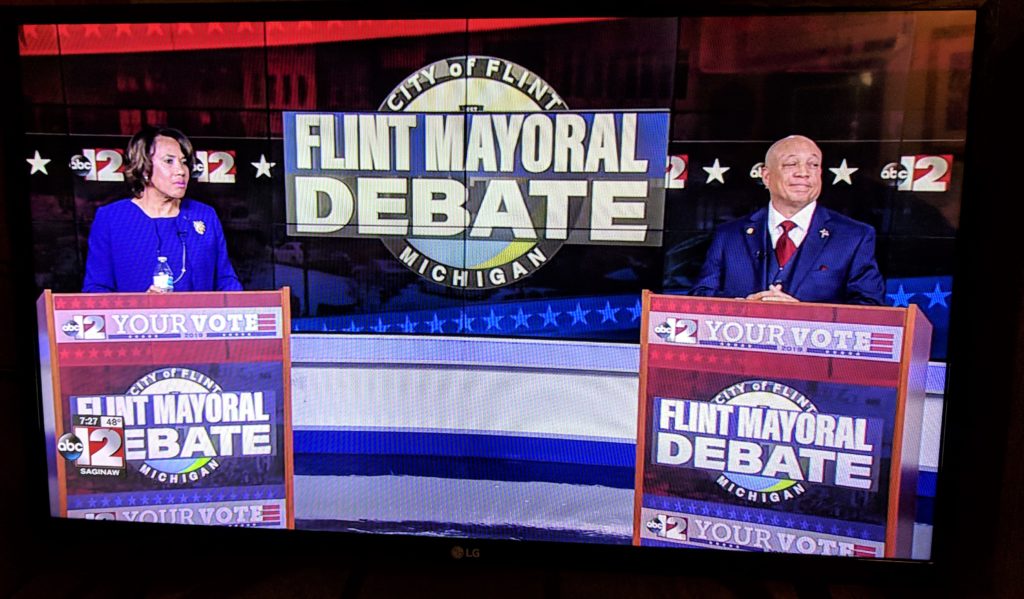
Mayor Karen Weaver and Rep. Sheldon Neeley at the mayoral candidate debate (Photo by Paul Rozycki)
By Paul Rozycki
With less than three weeks to go before the election, incumbent Mayor Karen Weaver and her challenger Rep. Sheldon Neeley, squared off in a debate on WJRT-TV12 on Thursday, Oct. 17.
It was the only scheduled debate between the candidates, who are running to be Flint’s next mayor on Nov. 5.
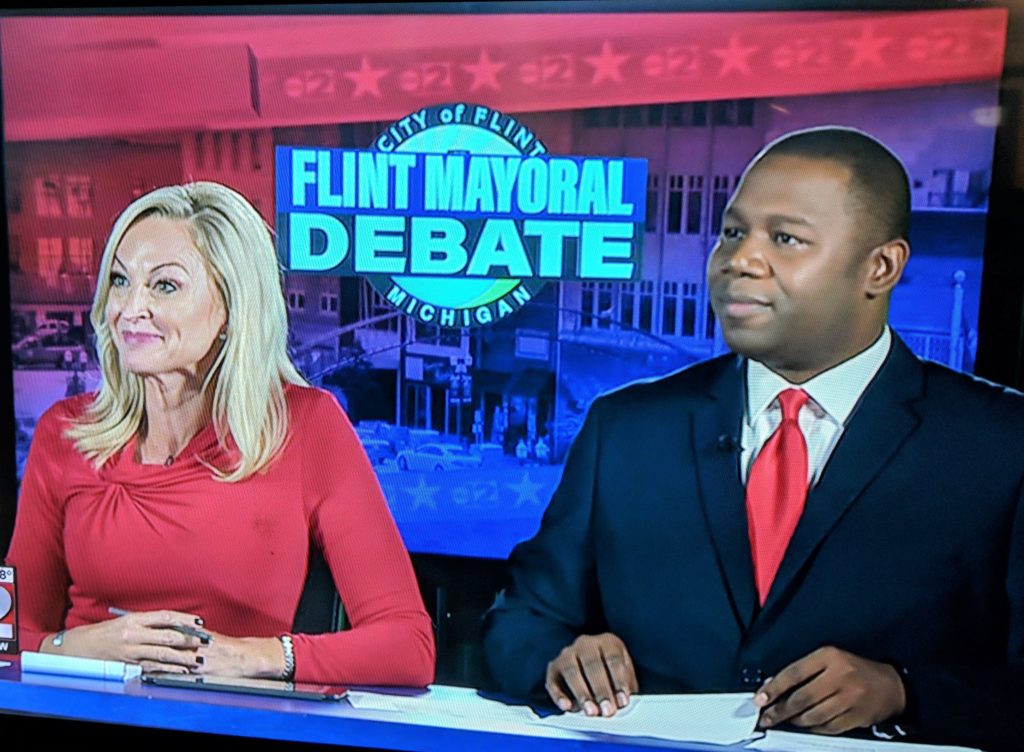
Moderators Angie Hendershot and Matt Franklin (Photo by Paul Rozycki)
Moderated by anchors Angie Hendershot and Matt Franklin, the two candidates responded to each other, and to viewers’ questions, as each made their case to the voters of Flint.
In a half-hour forum, they discussed the water crisis, infrastructure, restoring trust, the crime problem in Flint, the conflict with the city council, the financial problems that Flint faces, the rising poverty rate in the city, and were asked to conclude the event by saying something positive about each other.
In their opening remarks, Neeley said his campaign was based on his “five points of light—residential, recreational, educational, economics and safety.”
Mayor Weaver said she wished to “restore hope, faith and pride” in Flint.
One of the first questions was on the water issue, and both said that they would work to lower water rates by repairing leaking pipes “right sizing” the city.
On the issue of trust, in some of the most contentions exchanges, Weaver pointed to Neeley’s time on the council as a cause of many of Flint problems, and Neeley blamed Weaver for a lack of transparency in undermining trust in the system.
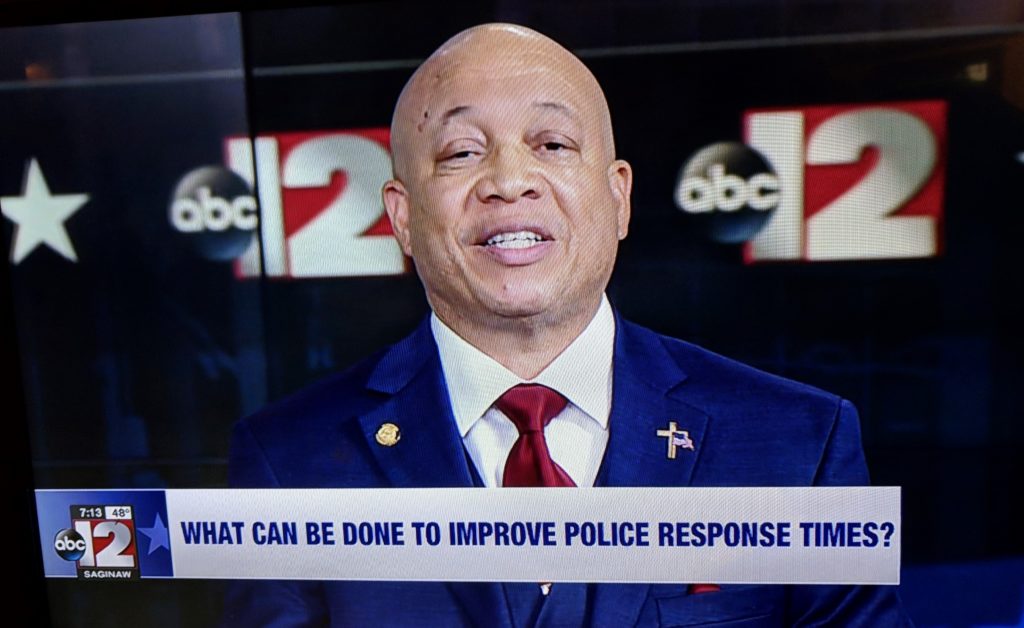
Sheldon Neeley (Photo by Paul Rozycki)
On the crime issue, Sheldon Neeley said that he would form a crime task force to focus on fighting crime in Flint and encouraged cooperation with the state police, the county sheriff and local college police. In response, Mayor Weaver said that Neeley had been on the council during some to the highest crime rates in the city, and said that she would also work with other units of government to coordinate crime fighting efforts.
In response to how each of them would work with the city council, Mayor Weaver said that while the conflict is a problem today, that there has been a long history of friction between the mayor’s office and the council over the years. Neeley said that his experience as a member of the council for nine years would give him the ability to work with the conflicts that have developed among council members.
The candidates were asked how they would deal with one of Flint’s most pressing issues—a declining tax base, and declining revenues. Rep. Neeley said that the key to generating new revenue for the city was to hire qualified individuals who were skilled at economic development and job creation. In response, Mayor Weaver asserted that she has hired qualified individuals and that it was important for those individuals to work with area foundations to assist the economic development of the city.
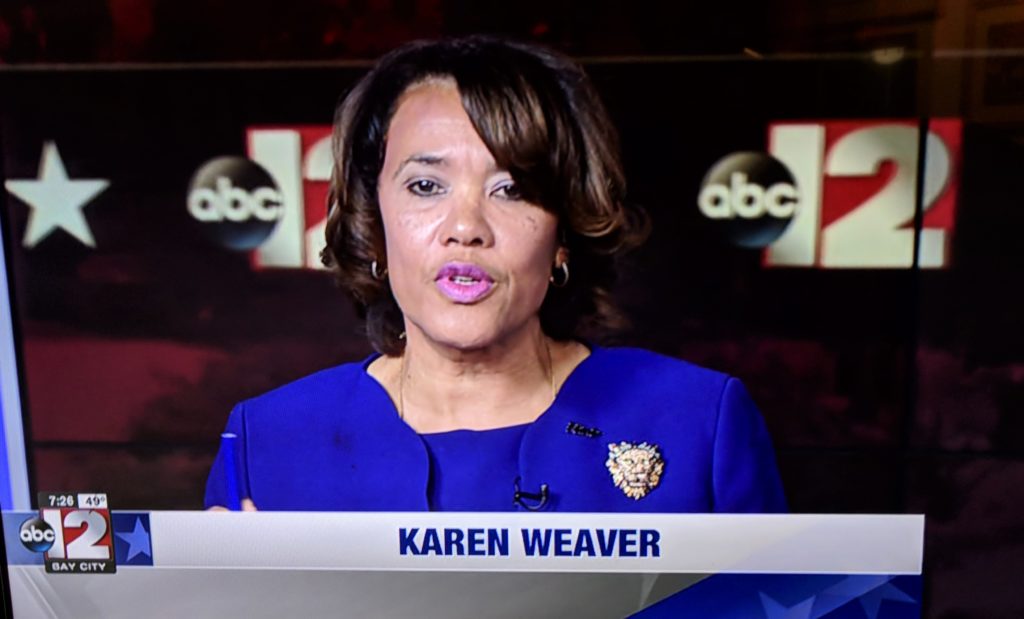
(Photo by Paul Rozycki)
On a similar topic, they were both asked how they would deal with Flint’s 40 percent poverty rate, one of the highest in the nation. Mayor Weaver said that she has assembled a team to create jobs, and develop economic growth in the city. In response Rep. Neeley emphasized his position as a state representative, and the role that the state has played in pushing for economic growth in Flint.
At the end of the broadcast both were asked to conclude by “saying something nice about the other.” Though both candidates clashed during the debate, they did have some good words for each other at the conclusion.
Neeley said that he had known Mayor Weaver and her family and that he considered her “a friend of mine” and hoped to be able to work with her as a partner when he was elected mayor. He said that this was not the time “to divide the community.”
Mayor Weaver said that she had been glad to work with Neeley in Lansing, considered him a “good family man” and hoped they could continue to work together in the future.
As they gave their closing statements Rep. Neeley said that he wanted to create a “community of victors, not a community of victims” as he urged voters to support him as “a leader who could restore hope in the community and unify people.”
Mayor Weaver in her closing statement, recounted the recent history of the city and reminded voters that under her leadership the emergency manager oversight ended, the water crisis saw much progress, and that there are new developments in jobs and economic growth in many parts of the city. She said that voters “should look at the progress that’s been made.” She said she was “am ambassador for Flint and a fighter for Flint.”
Mayor Weaver was elected in 2015, defeating Dayne Walling, and survived a recall attempt in 2017 with a majority vote. Sheldon Neeley served on the Flint City Council for nine years and is in his third term as a member of the state House for the 34th district.
After the debate, supporters of each of the candidates declared victory on Facebook.
Weaver and Neeley defeated two other candidates in the Aug. primary to earn the right to compete in the Nov. 5 election. In the primary Weaver got 42 percent of the vote, Neeley got 39 percent, followed by Don Pfeiffer who got 12 percent, and Greg Eason who had five percent.
Because this is the first election under the new city charter, the winner in the Nov. election will only serve a three-year term, until 2022. After that the mayor will be elected to a four-year term in the same year as the governor.
With only a few weeks to go, the campaign has been a fairly quiet one, so far, with both candidates trying to mobilize their supporters in what many expect to be a low turnout election. In the Aug. primary the turnout was about 12 percent, and many don’t expect much more than a 20 percent turnout on Nov. 5.
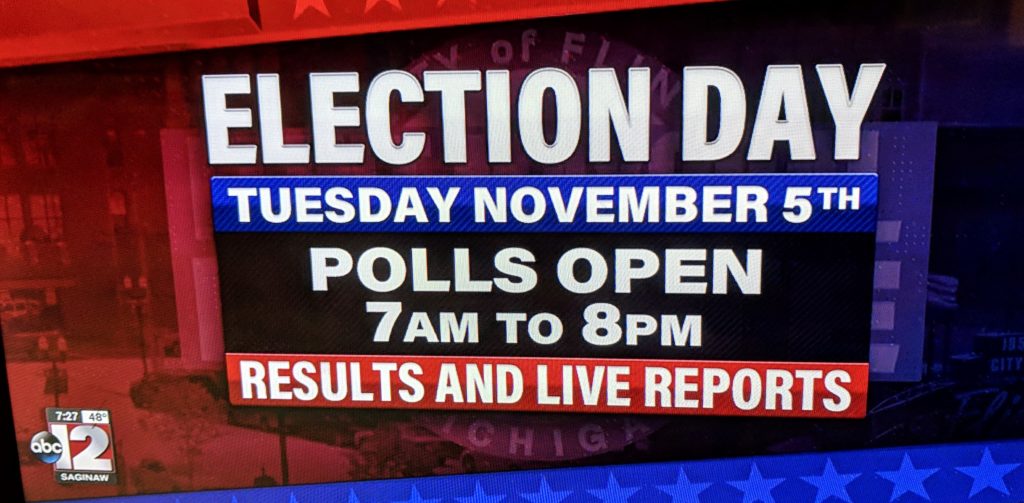
In addition to the mayoral contest, Flint voters will vote on a millage renewal and a new bond issue for the Flint Public Library. Voters outside of Flint will select council members and mayors in Clio, Burton, Flushing, Fenton and Grand Blanc. Voters in Davison, Gaines, and Grand Blanc Township are facing public safety millages, and school district millages are on the ballot in Birch Run, Fenton, Lake Fenton, Atherton and Lakeville schools.
EVM political commentator and staff writer Paul Rozycki can be reached at paul.rozycki@mcc.edu.



You must be logged in to post a comment.